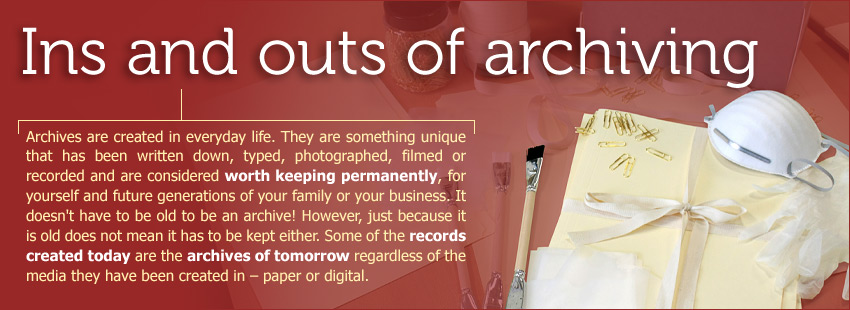What are archivists?
Professional archivists are qualified at postgraduate level and to gain a place on an archive course work experience is essential. An archivist needs many varied skills: patience, an enquiring and logical mind, attention to detail, research and communication skills and particularly a sense of humour – you can find yourself in some interesting, (not always clean), attics and basements.
Archivists arrange and catalogue records that are considered to have long term value so they can be accessed efficiently, saving their owners time and money. Archivists gain intellectual control over records by sorting and cataloguing them. Equally importantly they gain physical control, by storing them in acid free folders and boxes so they are protected in the long term. Archivists are guided by two important principles – provenance (the origin of the records) and original order as established by the person who created them.
To become members of the professional body the Archives and Records Association, archivists are bound by a Code of Conduct and client confidentiality is obviously a key component of that code.
The Jersey Archive
The Jersey Archive opened in 1993 to look after the records of the States of Jersey, businesses, individuals, families, charities, clubs and associations relating to the Island. It provides an excellent resource for preserving and making so many of the Island's historical records accessible to the public for research.
Professional archivists are qualified at postgraduate level and to gain a place on an archive course work experience is essential. An archivist needs many varied skills: patience, an enquiring and logical mind, attention to detail, research and communication skills and particularly a sense of humour – you can find yourself in some interesting, (not always clean), attics and basements.
Archivists arrange and catalogue records that are considered to have long term value so they can be accessed efficiently, saving their owners time and money. Archivists gain intellectual control over records by sorting and cataloguing them. Equally importantly they gain physical control, by storing them in acid free folders and boxes so they are protected in the long term. Archivists are guided by two important principles – provenance (the origin of the records) and original order as established by the person who created them.
To become members of the professional body the Archives and Records Association, archivists are bound by a Code of Conduct and client confidentiality is obviously a key component of that code.
The Jersey Archive
The Jersey Archive opened in 1993 to look after the records of the States of Jersey, businesses, individuals, families, charities, clubs and associations relating to the Island. It provides an excellent resource for preserving and making so many of the Island's historical records accessible to the public for research.
"members must not misuse or allow unauthorised disclosure or use of any information acquired by them in confidence in the course of their professional work".
What is a catalogue?
A catalogue is how an archivist gains 'intellectual' control over a collection of documents. It provides a much quicker means of understanding what is in a collection rather than trawling through the originals. Catalogue entries direct you to the original documents and are not meant to replace or duplicate them.
Information contained in a catalogue includes:
Some do's and don'ts
National Archives
National Council of Archives
International Council on Archives
A catalogue is how an archivist gains 'intellectual' control over a collection of documents. It provides a much quicker means of understanding what is in a collection rather than trawling through the originals. Catalogue entries direct you to the original documents and are not meant to replace or duplicate them.
Information contained in a catalogue includes:
- Synopsis of what the document/letter/report is about
- Names
- Dates
- Type of document eg: letter, report, photograph, plan
- Condition of the document
- Number of pages
Some do's and don'ts
- Date and identify - especially your photographs, the people and location. The more information recorded about a photograph or any written work today will make it much more relevant and interesting in the future
- Do not use elastic bands, over time they tend to stick to paper and create a brown mark
- Sticky tape does not last very well either; it also can become (even more) sticky and leave a brown mark when it falls off
- Water is the main cause of damage. Please store your archives carefully and preferably off the floor – as any water will always end up there
- Archives need air so they do not become musty. Do not seal paper or photographs in envelopes
- If paper is damp mould can grow and create irreparably damage
- A cooler environment is preferable
- As technology progresses copy your film and sound records (eg: cine film, cassettes, videos) on to new medium while the technology is still readily available to do so
National Archives
National Council of Archives
International Council on Archives

